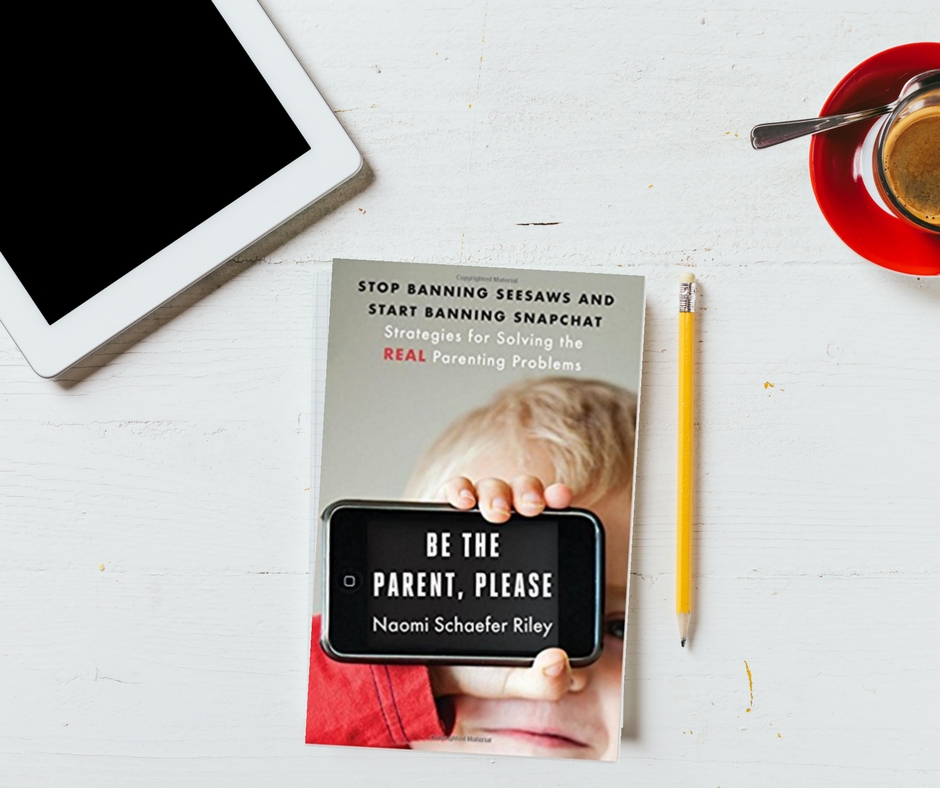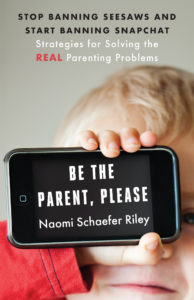Mar 2, 2018

“Parents are bombarded by technology. We’re all under a lot of pressure. But we’ve somehow lost all sense about parenting when it comes to screens. And we have sense when it comes to other things. Our kids don’t ask us for chocolate cake for breakfast every morning. And you know why? Because we’ve created the expectation that breakfast involves cereal and eggs and toast and fruit, and that’s it. With technology, if we create the expectation in our home that we don’t have screens on weeknights or we don’t use screens at the table or we don’t use screens at sleepovers, they will not bombard you everyday with 'Why can’t I have a screen at this meal? Why can’t I have a screen at this sleepover?' because they know what to expect. There’s something about screens that makes us throw common sense and parenting sense out the window."
Naomi Riley
In Episode 26, I’m chatting with Naomi Riley about her recently published book Be the Parent, Please: Stop Banning Seesaws and Start Banning Snapchat: Strategies for Solving the Real Parenting Problems. Trained in journalism, author of several books on a variety of subjects, and mother of three, Naomi has many insights on children’s need for boundaries when it comes to technology and screen time. She is a visiting fellow at the American Enterprise Institute and a former Wall Street Journal editor and writer whose work focuses on higher education, religion, philanthropy and culture. To find out more about Naomi’s work--including published articles and books and speaking engagements--visit her website at naomiriley.com.
In the interview, we talk about many things, including the importance of finding like-minded parents and being upfront with other parents and kids about the technology rules in your house or car. We also discuss all the shiny new technology being used in schools and the importance of setting realistic expectations for our kids depending on their ages and avoiding situations (when possible) where we use technology as a babysitter (like at long dinners at fancy restaurants or swim meets, for example).
Other topics covered in this episode include:
- When smartphones/social media became so ubiquitous.
- How schools are handling phone policies.
- The benefits of summer camp experiences that offer a break from technology.
- How kids respond well to limits and parents need to rally together to set those limits. It's hard to be the only parent with screen rules.
- Things in the news - rise in anxiety and depression corresponding with smartphone use.
- How parents have been blindsided by tech stuff, especially with devices being used at school.
- How to handle phones at sleepovers.
- Naomi's answer to a 6-year-old playmate of her son's asking her for a device: “You are the device.”
- Simple ways to set limits.
- The need for parents to trust the adults that you’re child is with. You need to know that your school/camp/wherever you send your kid will get in touch with you if there is a problem. If you feel like your child isn’t safe, then he/she shouldn't be there, with or without a phone.
- The importance of teaching kids to ask other adults for help if they need it.
Interested in Be the Parent, Please?
By Chuck Radke
 This is an incredibly
well-researched parenting book, one that blends seamlessly with
examples from the author's life and the lives of many other
parents. Each of its 10 chapters (Intro, 8 chapters,
Conclusion) is chock-full of current or recent research and
findings culled from reputable peer-reviewed journals and
full-length books. I admire the depth and credibility of the
sources. Despite the heavy scholarly orientation (it could be
a dissertation), it does not read like a bland piece of academic
writing or a loose collection of anecdotal information. The
writing is nicely controlled, accessible, and appealing to an
everyday reader.
This is an incredibly
well-researched parenting book, one that blends seamlessly with
examples from the author's life and the lives of many other
parents. Each of its 10 chapters (Intro, 8 chapters,
Conclusion) is chock-full of current or recent research and
findings culled from reputable peer-reviewed journals and
full-length books. I admire the depth and credibility of the
sources. Despite the heavy scholarly orientation (it could be
a dissertation), it does not read like a bland piece of academic
writing or a loose collection of anecdotal information. The
writing is nicely controlled, accessible, and appealing to an
everyday reader.Amazon Description
Toddlers on tablets. Pre-teens on Tumblr. Thanks to a variety of factors—from tech companies hungry for new audiences to school administrations bent on making education digital, to a culture that promotes everyone as the star of their own reality shows—technology is irrevocably a part of childhood, and parents are struggling to keep up. What should be allowed? What should be denied? And, given the ubiquity of technology and its inherent usefulness, what do sensible boundaries even look like?
A noted columnist and mother of three, Naomi Schaefer Riley fully understands the seductive nature of screens. For example, an afternoon of finger painting equals enormous cleanup of both house and hands. But an afternoon of iPad games? Just a swipe and a charger. Or what about car rides around town? Always having toys and books on hand isn’t a given, but your game-loaded smartphone is.
Riley draws us into her story and then walks us through the research on technology’s encroachment into each stage of childhood. She then offers "tough mommy tips": realistic, practical, applicable advice for parents who recognize that unlimited technology access is a problem, but who don’t know where to start in taking back control. These tips cover everything from placating an antsy toddler at your local favorite restaurant to best practices for keeping your teens safe from unsavory sites.
Any parent knows the effects of screens on their distracted, cranky, sedentary, and incessantly anxious-about-what-might-be-going-on-without-them kids. Naomi Schaefer Riley brings her experience, research, and no-nonsense candor to help parents prevent the children from falling under the destructive spell of technology.
Excerpted from Be the Parent, Please: Stop Banning Seesaws and Start Banning Snapchat. Published by Templeton Press. (c) 2018 Naomi Schaefer Riley.
When it comes to technology, parents must examine not only how they want their children to relate to the devices or how much of their time they want kids to spend texting or emailing or gaming or surfing. They need to decide something more fundamental—how their children are going to interact with the rest of the world.
It is not an exaggeration to say that giving your kids a cellphone is giving them the keys to the kingdom. There is a whole world out there that they can now access without your knowledge. That world, which will be constantly beeping at your child, will forever change him or her. It may change how your child views friendships, how he or she interacts with the outdoors, how he or she experiences time alone.
When we hand over phones and tablets to children, we are likely to be changing not only the information they can access but also their habits, their personalities, and their tastes. And while they may see their online life as a privilege -- if not a right -- we should also be honest enough to understand it as a burden. For the sake of our own convenience and their entertainment, we are giving up their freedom and perhaps even some of their happiness.
Tips for Cutting Back
Buy your child a watch and teach him or her how to use it. You may think that you need your kid to have a phone in order to arrange pickups and drop-offs, but you don’t agree to meet at a time. You are not Uber. If something goes wrong, teach your child how to ask the adult present to contact you.
Play the memory game. If you’re tempted to give kids technology because you can’t figure out how else they would entertain themselves or communicate with you or their friends, ask yourself how you did it as a kid. The answer won’t always be the right one, but it will give you perspective.
The book was recently featured in the Wall Street Journal, LA Times and Lifehacker.
